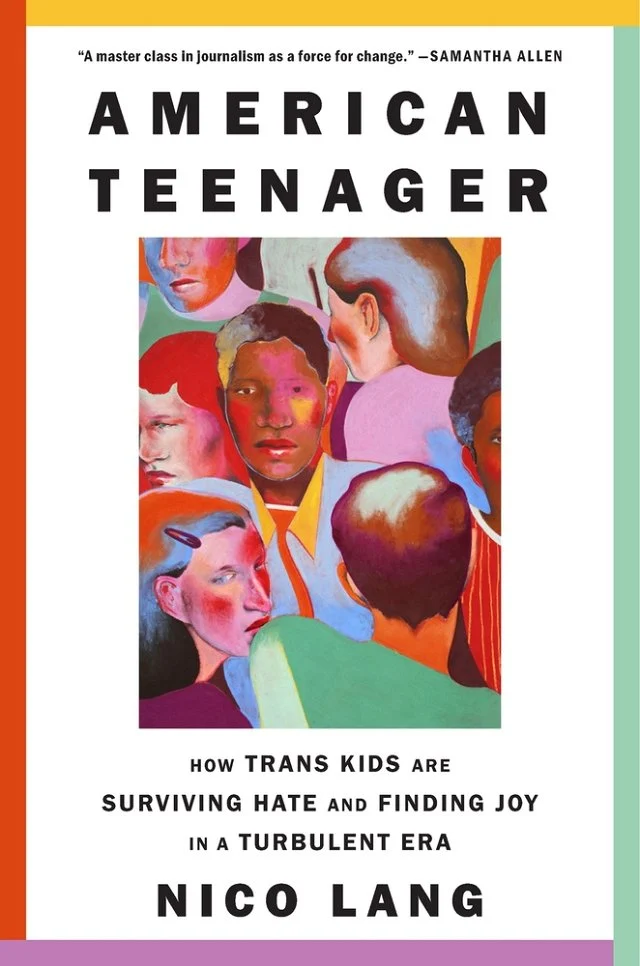"My Child is Trans, Now What?"—Ben Greene on Love, Support, and Celebration
- Boston Queers
- Mar 6, 2025
- 6 min read
Ben Greene is a speaker, educator, and advocate who has dedicated his life to helping allies support and celebrate the transgender community. After coming out as a teenager in a small Connecticut town, he quickly learned how to advocate for himself in a world that wasn’t always ready to understand. Now, as an adult, he’s using that experience to make things easier for the next generation. His book, My Child is Trans, Now What?, is a compassionate and practical guide for parents, educators, and allies who want to support trans youth—not just by addressing challenges, but by embracing joy. In this interview, Ben shares what inspired him to write the book, why focusing on joy is just as important as tackling hardship, and how families can create affirming spaces for the people they love.

What motivated you to write My Child is Trans, Now What? and what do you hope readers will gain from it?
I came out ten years ago as a teenager in a small town in Connecticut, and most of the folks around me were kind but confused. I spent a lot of time learning how to advocate for myself, and building the support systems I needed once it was already too late for me to use them. I was determined to leave my school better than I found it for the kids who came after me.
I like to joke that I was jumping out of a plane with a tarp and a sewing kit. As a transgender adult, I get to be the parachute factory. I wrote this book so parents, families, teachers, administrators, and allies can understand how they, too, can be a parachute and a soft place to land. How can we create a world where trans kids don't have to grow up too fast, don't have to be brave, just to be who they are?
Much of the national conversation around transgender youth focuses on struggle and hardship. Why is it important to center joy in these discussions, and how does your book help parents do that?
Of course it's important to talk about the challenges that transgender folks face. I live in Missouri--I couldn't possibly be blind to these challenges. But we talk about these challenges so much that they become the whole story. It doesn't occur to people to imagine transgender people as aging, as relaxed, as business owners, as parents, as happy and fulfilled people.
This can make it a lot harder to actually be supportive. When we support our loved ones from a place of fear of what could go wrong or anger at the world, that can only take us so far. Those aren't sustaining emotions. I focus on joy to change the question to "what am I trying to build? What could my child's future look like? What can we dream of together, and how can we get there?" This framework also helps parents not spend their whole support journey with their feet firmly planted in grief, fear, or shame. It's perfectly reasonable to have big emotions about your child's journey, but those are emotions we want to work through so that we bring full, enthusiastic and joyful support to our loved ones.

What are some ways parents can celebrate their child’s journey and affirm their identity in joyful, meaningful ways?
I think the biggest answer is there in the question: celebrate. Mark major milestones with a coming out party, or a top-surgery-anniversary party. By celebrating these moments with your loved one, you show them not just that you are tolerating their identity but celebrating it. We don't celebrate things unless we view them as good things. Show your child that their journey, their joy, is good!
Our milestones don't have to be medical either. Maybe we have a fashion show after their first big haircut, or their first time wearing a dress. Maybe we have weekly "heels walks" around the block where we practice together.
Whatever it is, our support journey doesn't have to be a long series of sad days and business meetings. It can and should be a fun journey (though there will be sad days throughout, they don't get to tell the story).
What role does family acceptance play in the long-term well-being of transgender youth?
My gosh, what role doesn't it play? Not just "on defense" against some of the scary concerns we have, but "on offense" in building a confident, resilient, well-adjusted adult. I will be neither the first nor the last to say that there are truly endless lifetime benefits to being a child who feels safe and loved.
How does your book address the feelings of fear or uncertainty that many parents experience upon learning their child is transgender?
Not to toot my own horn here (but, toot!) if you want a longer answer to this, you should check out an article I recently wrote about transition regret that was nominated for a GLAAD Media Award!

How can parents create a supportive environment at home, and what concrete actions can they take to affirm their child while also advocating for them in school settings?
This is a theme I drive home over and over again in the book: I'm here to be the toolkit, not the blueprint. I can give you lots of ideas of what might help, of what you could do or questions you could ask, but I have no idea what your loved one needs. Ask them how you can show up! Check in regularly about how you're doing and what you can do better.
Many states are introducing laws that restrict the rights of transgender youth, particularly around healthcare and sports participation. Do you address these challenges in your book, and what advice do you have for parents navigating these laws?
I definitely do discuss them in the book, as well as what fears or systems allowed things to get so bad and how to determine what kind of advocate you are. The biggest advice I have for parents struggling with these laws: don't try to do this alone. Don't let anyone convince you you're in a minority for caring. Get off social media and get to a PFLAG meeting, join Families United for Trans Rights (FUTR), Sign up for emails from your state-level advocacy organization.
In a time where these bills are made to make us feel powerless, recognize that you have so much power when you use your voice, stay informed (within reason) and figure out how to use your talents and passions to make a difference in your community.
What advice do you have for those who are hesitant to engage in conversations about gender identity due to a fear of making mistakes?
Don’t waste your time worrying if you’ll make a mistake, Of course you will! We’re humans all trying to do our best. We aren’t defined by our mistakes, though, we’re defined by what we do next. How do we take accountability? How do we apologize? How do we learn more and do better next time?
If you hold up a constantly shifting target of perfection, you will feel like a failure all the time. My goal as a human is simple: To be a little better today than I was yesterday, and a little better tomorrow than I was today.
Are there any upcoming projects or initiatives you're working on to further support the transgender community?
Yes! I have a new project I'm working on called "Good Queer News", which is a weekly newsletter featuring good news stories you may have missed, strategies for resilience and hope, personal stories, and reflections on how to choose joy right now. In a world that can feel so ceaselessly negative, my purpose has shifted to focus significantly on how we can use joy as the fuel to build the world we want to see.

Beyond your book, what other resources—books, websites, or organizations—do you recommend for parents who want to educate themselves about raising a transgender child?
I always start with recommending support groups like PFLAG or TransParent because it's so fantastic to have a local connection and community who's been through what you have.
In general, I would look for resources that heavily feature (or are led by) transgender people. Books written by trans people like he/she/they by Schuyler Bailar or American Teenager by Nico Lang.
If there’s one takeaway you hope every reader gets from your book, what would it be?
Let your loved one lead the way. They are the leading expert on their needs, their fears, their joys, their dreams. Only they can tell you what those needs are. Don't forget to keep coming back to the joy. How can we celebrate? What am I gaining on this journey? What is the new relationship I get to have with my child, and what am I learning about myself along the way?
I know it can feel frightening, but please remember that you are not by any means the first person to go on this journey, and you won't be the last either. The transgender community has survived so, so many attacks on us and our lives throughout all of human history. We will continue to fight, we will continue to survive, and no matter what we will continue to find our joy.
Resources and businesses mentioned in this interview:












Comments